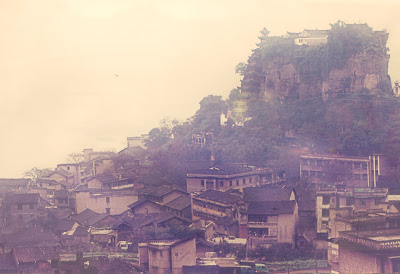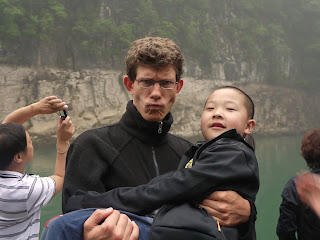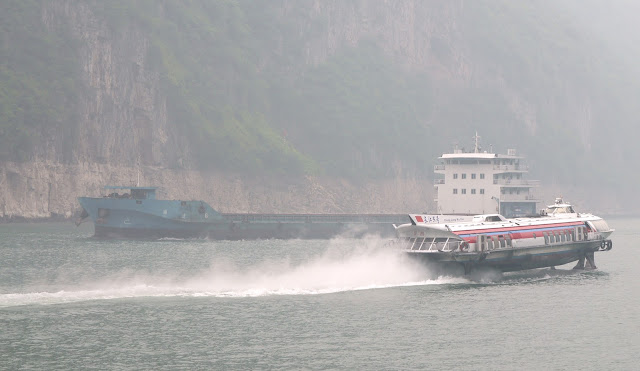From Yichang, I negotiated a passage on a Chinese tour boat up the Yangtze to Chongqing. The passage would take 3 days, and would include visits to important sights and temples along the way.
Our ship was the Chiang Jiang Guan Guang No. 6:
On board, strict rules were to be observed. For example, you could only burn the dress once the car was fully slipping:
My cabine-mates were a friendly bunch of lawyers from Southern China. Their firm had paid them an excursion, and now they were enjoying their time together, playing cards:
We had arrived on board at around 10 pm. As it had been a long day, I was a bit tired, but Chinese card players are Chinese card players, so it was quite late when we eventually switched off the light.
In the dark, you could hear the gentle noise of the machines, and see the lights of passing ships outside. It was very peaceful, and I was happy, enjoying China, the river, travelling, and being on a ship.
Until one of my cabine-mates started to snore. Soon they were all snoring heavily, and I was silently cursing whoever had invented snoring in the first place.
I must have fallen asleep, utterly exhausted, at around 5h30am. At 6am, somebody was shouting into my ear. It was our tour guide. All other passengers were already dressed and on their way to a small ship next to ours. We were going on an excursion!
Soon we were on our way to a small side-arm of the mighty Yangtze. Exploring the tour boat, I came past the bridge and said good morning to the friendly captain:
Across the valley, a huge highway bridge was being constructed:
Then we arrived at destination. Everyone had to get onto small boats, and we were rowed upstream by the last of the former trackers (John Hersey's A Single Pebble describes how these people were hauling ships up the river in former times).
Next to me, a small Chinese boy was sitting who was somehow not 100% convinced by the whole business:
On the way back, we passed another highway under construction:
One nice thing about river excursions is that you have a lot of time to take funny pictures:
Back on the big ship, it was time for lunch. The air in the on-board restaurant was amazingly hot and humid, but food was excellent:
After lunch, some people were playing Mahjong. Others were sitting on deck, watching the mountains passing by:
A Russian-built speed-boat overtook us, on its way to Chongqing:
On the shore, a couple of ships were being loaded with coal from a storage site on the mountain.
Later on, we came to the city of Wushan (巫山). After the construction of the Three Gorges Dam, the original town was abandonned and flooded by the rising waters, and a completely new town was constructed on the hills above the old town's site.
In the evening, we stopped near to another small town that had recently been relocated. The spot was quite picturesque, even though the town together with its medieval fortress and pagoda was still under construction:
Somehow, the town embodied the Chinese understanding that a cultural heritage site does not necessarily have to be old or original, as long as it looks so. Still, once finished this will surely be a nice place. Sitting on the half-ready city walls, I watched the sunset behind the mountains:
The next morning, I woke up just before our tour guide stormed the cabin. It was 6am, and time for another excursion.
We were going to visit the hill of Shibaozhai. Before the construction of the dam, the hill and its famous pavilion were sourrounded by small houses. Now a coffer dam has been constructed to save the pavilion, the houses are no longer, and the hill has become an island.
 |
| Shibaozhai (old picture, before the dam was built) |
To reach the island, carriers were available for hire. One weighty member of our group knew no pity, and the carriers had to put on a brave face to bring him to the hill.
The pavilion (a sort of staircase to the temple on the top) was beautiful, and well worth the visit:
From the top, one could see the morning mist rising from the river. The cranes adorning the temple's roof looked as if they were alive, ready to fly away.
Later in the day, we came to Fengdu Ghost City. While the old town of Fengdu has also disappeared under the waters, on the opposite shore of its rebuild newer version is a mountain full of temples, graves and statues that was high enough to remain dry.
Still, as so many other sights, the mountain's lower part is now protected by a huge dam against the water.
The central path uphill was crowded with tourists, but as the area is quite extensive, it was not difficult to lose onerself on one of the many side-paths. After a short time, I found myself alone in a dense jungle full of empty houses and temples:
In the temples, strange people were looking at you with mocking smiles:
Early the next morning, we arrived in Chongqing. As my cabin-mates had healthily kept snoring each night throughout the trip, I was so exhausted from lack of sleep that I somehow missed the whole arrival, so that our tour guide had again to wake me up.
Soon, we were all standing in a long queue to leave the ship. Although we had spent only a little more than 2 days together, it was as if I had known some of my travel-mates for much longer, so saying good-bye was a bit of a sad affair.


















































I love this whole trip of yours. The view is superb. The place is great. It is really ideal.
ReplyDeletebrilliant. the food looks amazing.
ReplyDelete